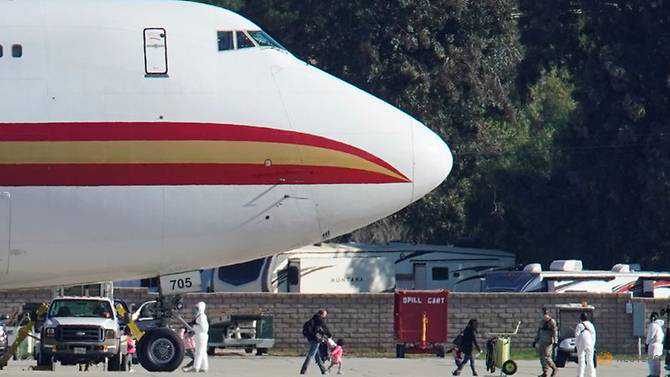US evacuees from Wuhan placed under 72-hour 'hold' at California military base
30 January, 2020

Nearly 200 American citizens airlifted from China in the midst of the coronavirus outbreak arrived on Wednesday (Jan 29) at a US military base in California, where they will remain isolated for at least 72 hours of medical evaluation, public health officials said.
The group, mostly US diplomats and their families, were evacuated from Wuhan at the epicentre of the outbreak aboard a US government-chartered plane that stopped to refuel in Alaska on Tuesday night before flying on to March Air Reserve Base, about 60 miles (97km) east of Los Angeles.
Foreign governments have begun flying their citizens out of Wuhan, as the death toll has risen and the city has entered into a virtual quarantine, with Chinese authorities trying to contain the virus.
The 195 passengers at March air base were medically screened by Chinese government and US State Department officials before boarding the plane in Wuhan, and again in Alaska by a team from the US Centers for Disease Control and Prevention, CDC officials said.
All the passengers have agreed to voluntarily remain in special housing at the military base, cordoned off from base personnel, for 72 hours.
"These people are not under federal quarantine orders," said Dr. Christopher Braden, deputy director of the CDC's National Center for Emerging and Zoonotic Infectious Diseases.
"I personally talked to them when they were disembarking and going through their first screening checks. They were happy to be here. They were very cooperative with the questions," Braden told a news conference at the Riverside University Health System Medical Center, near the base.
NO ONE SHOWED SYMPTOMS
The US evacuees, who underwent another round of screening on arrival in California, will be given further medical evaluations, including a blood test for exposure to the virus, over the next three days, the officials said.
None of the arriving passengers has so far exhibited any symptoms of illness, the officials said.
The screening in Alaska included a questionnaire to check for factors that would deem them to have been at high risk of infection, including exposure to someone diagnosed with coronavirus or close contact to someone living with a person who was sick.
"There were no individuals who responded to the questions indicating they were high risk," Dr Nancy Knight, director of the CDC's Division of Global Health Protection. "We are reassessing that now."
One person on the original evacuation manifest was barred from boarding the plane in China because they had a fever.
The plan is to allow the evacuees to return to their homes once the initial evaluation period is over, provided there is no indication of exposure or illness, the officials said.
At that point, absent any symptoms or a positive test result, an individual would be considered non-infectious, and would be permitted to travel on public transportation without putting others at any risk, Braden said.
FREE TO LEAVE?
People who may be incubating the infection before any symptoms appear are not believed to be contagious, Braden said.
However, health authorities will continue "active monitoring" of all the passengers through the end of a 14-day incubation period, and plans are in place to isolate any individual who shows signs of illness after they go home.
If any evacuees test positive or falls ill in the next three days, they would be transferred to the Riverside Medical Center for isolation and treatment, and authorities would decide what measures need to be taken for the rest of the group, Braden said.
Asked if someone in the group who tested negative before the 72-hours hold was over would be free to leave the base early if they wanted, Knight said that would lead to a conversation that "would be discussed up to the highest levels within the US government," Knight said.
"If we think a person is a danger to the community, we can institute an individual quarantine for that person, and we will," Braden added. "If we think it's risky, then we have the tools to protect the public and we will use them."
So far, five cases of coronavirus have been diagnosed in the United States, none of them fatal, Braden said. A further 165, other than the plane passengers, are under evaluation.
"There's no indication we have any transmission from those cases, and therefore the risk for people in the United State, we believe, is low," Braden said.
Source:
